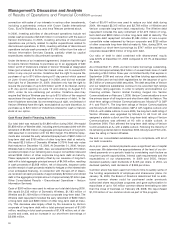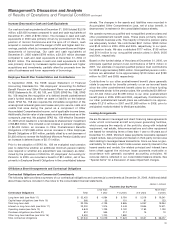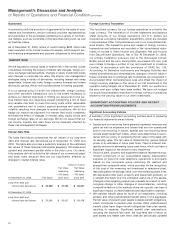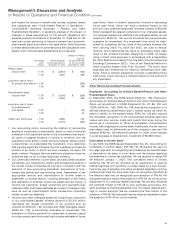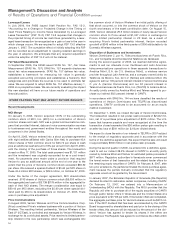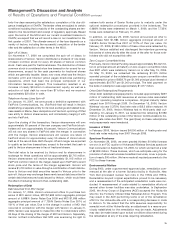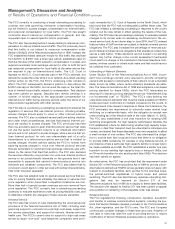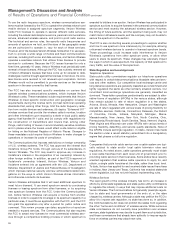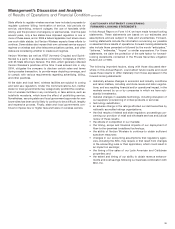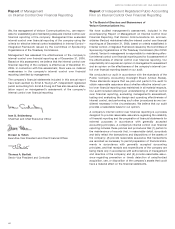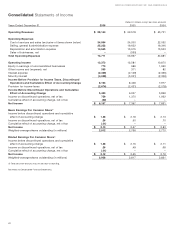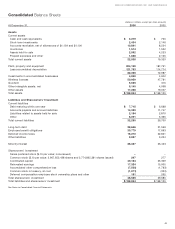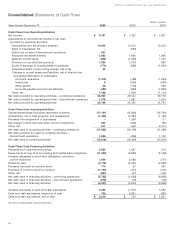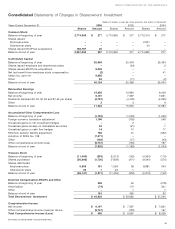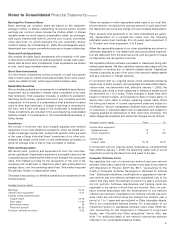Verizon Wireless 2006 Annual Report Download - page 39
Download and view the complete annual report
Please find page 39 of the 2006 Verizon Wireless annual report below. You can navigate through the pages in the report by either clicking on the pages listed below, or by using the keyword search tool below to find specific information within the annual report.
ously remanded by U.S. Court of Appeals for the Tenth Circuit, which
had found that the FCC had not adequately justified these rules. The
FCC has initiated a rulemaking proceeding in response to the court’s
remand, but its rules remain in effect pending the results of the rule-
making. The FCC also has proceedings underway to evaluate possible
changes to its current rules for assessing contributions to the uni-
versal service fund. As an interim step, in June 2006, the FCC ordered
that providers of VoIP services are subject to federal universal service
obligations. The FCC also increased the percentage of revenues sub-
ject to federal universal service obligations that wireless providers may
use as a safe harbor. These decisions are the subject of a pending
appeal. Any further change in the current assessment mechanism
could result in a change in the contribution that local telephone com-
panies, wireless carriers or others must make and that would have to
be collected from customers.
Unbundling of Network Elements
Under Section 251 of the Telecommunications Act of 1996, incum-
bent local exchange carriers were required to provide competing
carriers with access to components of their network on an unbundled
basis, known as UNEs, where certain statutory standards are satis-
fied. The Telecommunications Act of 1996 also adopted a cost-based
pricing standard for these UNEs, which the FCC interpreted as
allowing it to impose a pricing standard known as “total element long
run incremental cost” or “TELRIC.” The FCC’s rules defining the
unbundled network elements that must be made available at TELRIC
prices have been overturned on multiple occasions by the courts. In
its most recent order issued in response to these court decisions, the
FCC eliminated the requirement to unbundle mass market local
switching on a nationwide basis, with the obligation to accept new
orders ending as of the effective date of the order (March 11, 2005).
The FCC also established a one year transition for existing UNE
switching arrangements. For high capacity transmission facilities, the
FCC established criteria for determining whether high capacity loops,
transport or dark fiber transport must be unbundled in individual wire
centers, and stated that these standards were only expected to affect
a small number of wire centers. The FCC also eliminated the obliga-
tion to provide dark fiber loops and found that there is no obligation
to provide UNEs exclusively for wireless or long distance service. In
any instance where a particular high capacity facility no longer has to
be made available as a UNE, the FCC established a similar one year
transition for any existing high capacity loop or transport UNEs, and
an 18 month transition for any existing dark fiber UNEs. This decision
has been upheld on appeal.
As noted above, the FCC has concluded that the requirement under
Section 251 of the Telecommunications Act of 1996 to provide unbun-
dled network elements at TELRIC prices generally does not apply with
respect to broadband facilities, such as fiber to the premises loops,
the packet-switched capabilities of hybrid loops and packet
switching. The FCC also has held that any separate unbundling obli-
gations that may be imposed by Section 271 of the
Telecommunications Act of 1996 do not apply to these same facilities.
The decision with respect to Section 271 has been upheld on appeal
and a petition for rehearing of that appellate order was denied.
Wireless Services
The FCC regulates the licensing, construction, operation, acquisition
and transfer of wireless communications systems, including the sys-
tems that Verizon Wireless operates, pursuant to the Communications
Act, other legislation, and the FCC’s rules. The FCC and Congress
continuously consider changes to these laws and rules. Adoption of
new laws or rules may raise the cost of providing service or require
modification of Verizon Wireless’s business plans or operations.
37
The FCC currently is conducting a broad rulemaking proceeding to
consider new rules governing intercarrier compensation including,
but not limited to, access charges, compensation for Internet traffic,
and reciprocal compensation for local traffic. The FCC has sought
comments about intercarrier compensation in general, and has
requested input on several specific reform proposals.
The FCC also has pending before it issues relating to intercarrier com-
pensation for dial-up Internet-bound traffic. The FCC previously found
that this traffic is not subject to reciprocal compensation under
Section 251(b)(5) of the Telecommunications Act of 1996. Instead, the
FCC established federal rates per minute for this traffic that declined
from $.0015 to $.0007 over a three-year period, established caps on
the total minutes of this traffic subject to compensation in a state, and
required incumbent local exchange carriers to offer to both bill and
pay reciprocal compensation for local traffic at the same rate as they
are required to pay on Internet-bound traffic. The U.S. Court of
Appeals for the D.C. Circuit rejected part of the FCC’s rationale, but
declined to vacate the order while it is on remand. As a result, pending
further action by the FCC, the FCC’s underlying order remains in
effect. The FCC subsequently denied a petition to discontinue the
$.0007 rate cap on this traffic, but removed the caps on the total min-
utes of Internet-bound traffic subject to compensation. That decision
has been upheld on appeal. Disputes also remain pending in a
number of forums relating to the appropriate compensation for
Internet-bound traffic during previous periods under the terms of our
interconnection agreements with other carriers.
The FCC also is conducting a rulemaking proceeding to address the
regulation of services that use Internet protocol, including whether
access charges should apply to voice or other Internet protocol
services. The FCC also considered several petitions asking whether,
and under what circumstances, services that employ Internet pro-
tocol are subject to access charges. The FCC previously has held
that one provider’s peer-to-peer Internet protocol service that does
not use the public switched network is an interstate information
service and is not subject to access charges, while a service that uti-
lizes Internet protocol for only one intermediate part of a call’s
transmission is a telecommunications service that is subject to
access charges. Another petition asking the FCC to forbear from
applying access charges to voice over Internet protocol services
that are terminated on switched local exchange networks was with-
drawn by the carrier that filed that petition. The FCC also declared
the services offered by one provider of a voice over Internet protocol
service to be jurisdictionally interstate on the grounds that it was
impossible to separate that carrier’s Internet protocol service into
interstate and intrastate components. The FCC also stated that its
conclusion would apply to other services with similar characteristics.
That order has been appealed.
The FCC also has adopted rules for special access services that pro-
vide for pricing flexibility and ultimately the removal of services from
price regulation when prescribed competitive thresholds are met.
More than half of special access revenues are now removed from
price regulation. The FCC currently has a rulemaking proceeding
underway to evaluate experience under its pricing flexibility rules, and
to determine whether any changes to those rules are warranted.
Universal Service
The FCC also has a body of rules implementing the universal service
provisions of the Telecommunications Act of 1996, including rules
governing support to rural and non-rural high-cost areas, support for
low income subscribers, and support for schools, libraries and rural
health care. The FCC’s current rules for support to high-cost areas
served by larger “non-rural” local telephone companies were previ-
Management’s Discussion and Analysis
of Results of Operations and Financial Condition continued





